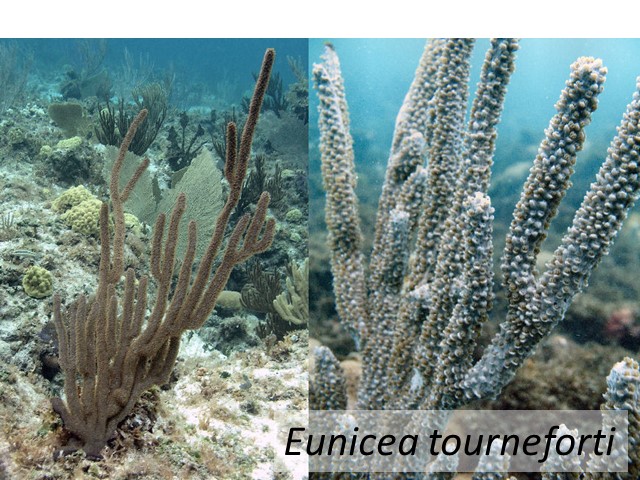
Family: Plexauridae
Common Name(s): Knobby candelabra, Tournefort's eunicea.
Colony Form: Candelabrum in single plane with long thick branches; may become treelike/bushy with sufficient growth; to ~60 cm tall.
Axis: Elliptical in cross-section.
Branches: Few, separated stiff, sometimes reuniting with each other, compressed in plane of candelabrum; terminal branches <50% colony height, 10-15 mm diameter; candelabrum form generally with few tapering branches.
Apertures: Gaping; spiny lower lip oriented upward, sometimes covering upper lip; space between apertures wider than aperture diameter; lower lips of apertures may be particularly prominent at branch tips.
Mucus: Absent
Color: Usually dark brown to gray when living; dried specimens can turn lighter.
Sclerites: Polyp armature strong, without collar, of ornate and/or flat rods to 0.25 mm long. Axial layer: spindles with complex ornaments, colorless radiates or pale violet forms. Middle layer: large stout spindles to 2 mm long and 0.38 mm wide (3.5 times longer than wide). Surface layer: many small foliate clubs to 0.15 mm long; larger clubs lack an axial pattern (i.e. handle and head).
Habitat: Reefs or hard bottoms, 25-30 m in depth (complete range unknown). Usually in zones of strong water motion.
Distribution: Widespread: Bahamas, Bermuda, South Florida, Gulf of Mexico, and throughout the Caribbean Sea.
References: Bayer (1961), Cairns (1977), Collin et al. (2005), Sánchez (2009), MSIP (2010).
Similar Species: Eunicea laciniata; Eunicea asperula







